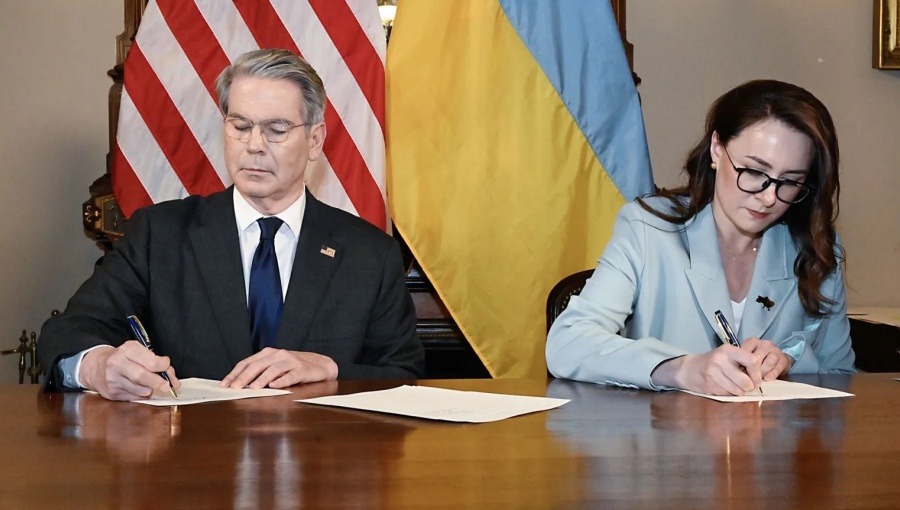After months of tense negotiations, the United States and Ukraine have signed a landmark agreement granting Washington access to Kyiv’s critical minerals and natural resources — a deal Ukrainian leaders believe could anchor long-term American military support as the war with Russia drags into its third year.
Signed on Wednesday by Ukraine’s Economy Minister Yulia Svyrydenko and U.S. Treasury Secretary Scott Bessent, the agreement outlines joint control over a newly established reconstruction fund and lists 55 critical minerals — including rare earth elements, titanium, lithium, and uranium — as available for future development.
Svyrydenko hailed the agreement as a “mutually beneficial” breakthrough, noting in a social media statement that “the United States notes its commitment to promoting long-term peace in Ukraine and recognizes the contribution that Ukraine has made to global security by giving up its nuclear arsenal.”
The deal, pending ratification by the Ukrainian parliament, represents a significant shift from earlier drafts, which Ukrainian officials had criticized for undermining national sovereignty. Prior proposals would have granted Washington wide-reaching rights to Ukrainian resources and demanded $500 billion in profits — terms President Volodymyr Zelenskyy rejected during a tense Oval Office meeting with U.S. President Donald Trump and Vice President JD Vance.
Equal Partnership, No Debt Burden
Unlike earlier drafts, the current deal explicitly maintains Ukraine’s full ownership over its natural resources. Only untapped or future investments will be shared, and any existing state revenues from resource extraction remain untouched. Kyiv will retain authority over what is extracted, where, and when, with profits from new ventures flowing into the reconstruction fund — not toward repaying past U.S. aid.
“No profits will be withdrawn from the fund for the first 10 years,” Svyrydenko confirmed, adding that Ukraine will contribute half of all profits from state-owned resources. In return, Washington will offer direct funding, equipment, and vital military aid — including advanced air defense systems.
The fund will be jointly managed by both nations and facilitated by the U.S. International Development Finance Corporation, which Ukraine hopes will attract Western investors and technology for projects in mining, oil, gas, and infrastructure.
Critical Minerals and Global Strategy
The agreement comes at a pivotal moment in U.S. foreign policy, as Secretary of State Marco Rubio declared this week “very critical” for American-led efforts to bring the war to a close. Washington views the pact not only as a strategic step in support of Ukraine’s sovereignty but also as a means to reduce reliance on China — the world’s dominant supplier of rare earth elements.
Rare earth elements, like lanthanum, cerium, and scandium, are essential for producing electric vehicles, mobile phones, and military equipment. By tapping into Ukraine’s vast but underdeveloped reserves, the U.S. hopes to diversify global supply chains.
“[This deal] signals clearly to Russia that the Trump administration is committed to a peace process centered on a free, sovereign, and prosperous Ukraine,” said Bessent in a formal statement.
Industry Outlook and Wartime Constraints
Ukraine’s mineral sector accounted for 6.1% of GDP and nearly a third of exports in 2021, but much of its potential remains untapped. A lack of reliable geological data and restrictive state policies have slowed development problems compounded by Russia’s continued occupation of eastern territories.
According to the Kyiv-based think tank We Build Ukraine, roughly 40% of the nation’s metallic mineral reserves are inaccessible due to Russian control. However, Ukraine still holds some of Europe’s largest known reserves of titanium and lithium, both crucial for advanced manufacturing and green technology.
Ukrainian officials believe fast-tracking this agreement is crucial both to leverage resources before further Russian advances and to keep Washington engaged.
By striking a deal that rejects past exploitative terms, Kyiv now hopes to lock in long-term Western investment and protect its sovereignty, all while gaining the tools it needs to rebuild and defend.


